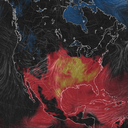Dangerous heat wave expands and intensifies, warnings blanket much of U.S.

More than 125 million Americans are under heat warnings and advisories on Monday evening as a dangerous heat wave that began in the Southwest covers more real estate in the Central and Southern U.S.
The big picture: The National Weather Service (NWS) is warning that a "dangerous" combination of heat and humidity will affect the majority of the lower 48 states before the week is over, and there are few signs the heat will abate after that.
- All of Arkansas, Kentucky, Missouri, Mississippi, Illinois, Iowa and Indiana are under heat warnings plus parts of at least a dozen other states.
- The heat wave is courtesy of a strong area of high pressure, or heat dome, that is slowly moving east across the Central U.S.
- The heat dome is likely to shift eastward during the first part of the week, but then careen back west in a see-saw pattern, setting up hotter conditions again for the Upper Plains and Central states later in the week.
- Climate change is causing heat waves such as this one to be more severe, frequent and longer-lasting than just a few decades ago.
Why it matters: Heat waves are the deadliest type of severe weather hazard in the U.S., and they especially target low-income residents who may lack access to air conditioning. They are also particularly dangerous for outdoor workers.
Threat level: As of Monday morning, heat watches, advisories and warnings were in effect from the Carolinas to Texas, extending north into Wisconsin and Minnesota and south to the Gulf Coast.
- An early-season excessive heat warning is in effect for Minneapolis on Tuesday, when heat indices (the combination of heat and humidity) are expected to climb as high as 105°F.
- According to Axios Minneapolis' Nick Halter, the city's public school district will close 14 schools on Tuesday that don't have air conditioning, and move those students to e-learning. City schools are still in session to make up for a three-week teacher strike in the spring.
- Highs in many places, including Chicago; Des Moines, Iowa; St. Louis; Little Rock, Arkansas; and Memphis, Tennessee, are likely to hit 100°F today and tomorrow, threatening heat records.
- High temperatures will be 20°F to 30°F above average for this time of year in many locations.
To put this heat in perspective - there are entire summers when an Excessive Heat Warning (3 of the last 10) was never issued for the Mid-South. For years when an Excessive Heat Warning was issued...the average date of the first warning...July 12th. #tnwx #mswx #mowx #arwx pic.twitter.com/DGBmG3KxNl
— NWS Memphis (@NWSMemphis) June 13, 2022
Of note: For the Central states, this will be a prolonged event. The lack of nighttime heat relief, with many records set for warmest overnight temperatures, raises the health risks associated with it.
- "This is serious heat, so don`t underestimate it," the NWS forecast office in Memphis states on its website. "Stay indoors if possible. Forget strenuous activities outdoors during the heat of the day."
By the numbers: Forecast highs in multiple cities illustrate the severity of this extreme heat event.
- 98°F: Forecast high temperature Monday in Memphis. The heat index there is expected to exceed 110°F, as dew points are running at tropical levels in the low 80s. For perspective, anything above a 70°F dew point feels sultry.
- 100°F: Forecast high temperature in Denver on Monday, which would be the second triple-digit reading there since the heat wave began.
- 97°F: Forecast high temperature in Chicago on Tuesday, which is about 30°F above average for this time of year.
Meanwhile, along with the extreme heat, wildfires broke out this weekend in Arizona, New Mexico, California and Colorado.
- "Critical" fire weather conditions are expected Monday from the Southwest to the southern and central Rockies to the High Plains, NWS said.
- The highest fire danger on Monday will be across a four-state region already hit hard by fires this year, including Colorado, New Mexico, Arizona and Utah.
- High winds will hit parts of Southern California, increasing the fire threat there.
The bottom line: This is no ordinary June heat wave, and the NWS is urging residents in its path to take it seriously.
Editor's note: This story has been updated to reflect the most current heat warnings.